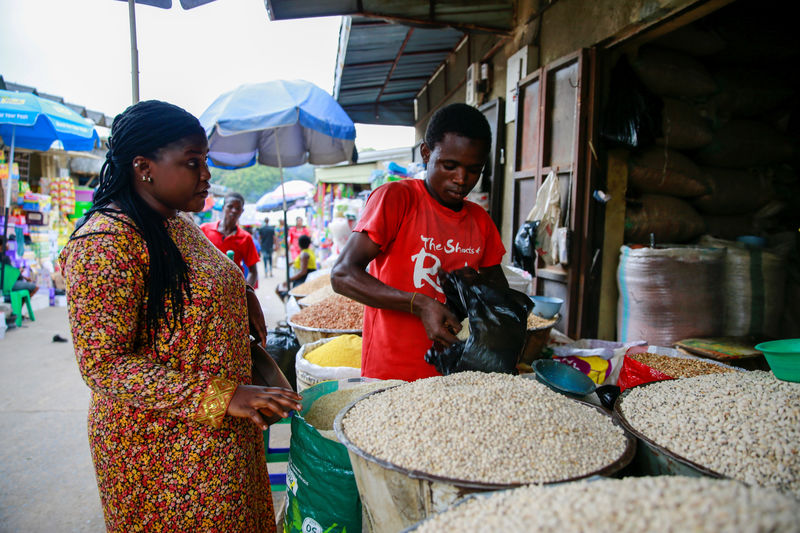The rising cost of food, due to inflation, has continued to take its toll on Nigerians, forcing families to adjust to the starko realities, findings by Daily Trust Saturday revealed.
This is even as analysts have warned that the worst is yet to come given the recent flooding experienced in most parts of the country.
They said more impact of the situation might be felt within the next six months.
Our findings showed that while most families have resorted to rationing as a way of contending with the situation, others have been forced to reduce meals for their children.
- Nigeria can’t afford to substitute democracy – Gambari
- HYPPADEC pledges more interventions in communities
Escalating food prices
At Ikate in Surulere, a suburb of Lagos, Nigeria’s commercial capital, Doris Nwachukwu, a foodstuff seller, said she watched her customers grapple with escalating prices over the past months.
“Rice, garri, onions, noodles, everything has risen in price. Some have more than doubled, others have jumped by various percentages,” she said.
Our survey revealed that garri, one of Nigeria’s staples, which sold for N500 in January this year for a paint bucket, rose to N700 in March, then climbed to N1,100. The same paint bucket currently sells for N1,000.
Also, a 50kg bag of local rice has risen, currently selling for N36,000. In January, the same quantity sold for N27,000.
“But most buyers’ incomes have remained unchanged. People are complaining about lack of money when they come to buy. When you tell them that a bag of rice is now N36,000 they will say they budgeted N30,000. They would wonder how it rose from N30,00 to N36,000 within a short time.
“In some cases, an intending customer decides not to buy. Some who planned to buy one bag will now buy half or quarter. That’s what we are seeing now,” Nwanchuku explained.
Spaghetti, which serves as a substitute for rice, has also risen in cost. Its price per pack has moved from N150 to N250, N350, and now, N450.
A bag of spaghetti containing 20 packs, which hitherto sold for N5,500 now sells between N7,900 and N8,000.
Elsewhere in Kano (North West), a trader, Shuaibu Mahammed, who owns a little shop in Singer Market, said he was surprised at the increase in prices of commodities on a daily basis.
He said he no longer bought foodstuff in bulk as his little capital would not afford that, else he would run out of business.
“I now buy in mudu (local measurement plate) every day, and for ingredients, I buy in pieces.
“The prices keep increasing day by day. This is really affecting us. Many small marketers have gone out of capital because they have to feed their families.
“A mudu of local rice we used to reject at N300 is now N1,500, and we are rushing to buy it. It doesn’t end there as there are other needs like school fees and some unexpected things like sickness, which is also very expensive, “he said.
A widow and mother of four, Habiba Sama’ila, 40, said the rising prices of foodstuff, coupled with the death of her husband a few years ago, forced her to give up on any business as all her capital and savings goes into feeding the family.
“Nobody is talking about going to the market to buy foodstuff now. We are buying at home because we normally buy in pieces since we cannot afford to buy in bulk.
Things are going high every day. We are no longer thinking of anything other than food, and it is going high. People like me that have no one to support are in trouble,” she lamented.
Rising inflation
What is happening in Ikate (Lagos) and Singer (Kano) is a general phenomenon in Nigeria as prices of virtually all known household items have risen.
This has led to a spike in inflation generally.
Nigeria’s annual inflation continued its seven-month climb in September, rising to 20.77 per cent, marginally up from 20.54 per cent in the month before. This is a 17-year high. In the previous months of May, June and July, inflation printed at 17.71 per cent, 18.6 per cent, and 19.64 per cent respectively.
Correspondingly, food inflation always came out higher: 19.5 per cent, 20.6 per cent and 22 per cent, respectively.
This has hurt the poor, said Dr Muda Yusuf, president of the Centre for Private Enterprise and former director-general of the Lagos Chamber of Commerce and Industry.
“As you can see, they are not faring well. The percentage of the family budget that people are using now for food has risen as high as 70 per cent, some even as high as 80 per cent because at least you have to eat; you have to feed your family,” he told Daily Trust Saturday in an interview.
This supports Nwachukwu’s description of buyers’ reaction to the new prices. “They are not happy; they are complaining. But because ‘man must eat, they have to buy. They complain but they buy,” she said.
Yusuf noted that one consequence of this is a rise in the poverty level in Nigeria, with more people falling below the poverty line.
This phenomenon is the biggest problem for the poor: the erosion of their purchasing power, Yusuf said.
“If we have to deal with this problem of poverty, apart from dealing with the problem of productivity in the economy, we have to deal with the problems of inflation so that the little the poor earn can at least buy something that is tangible for them.
“But now, over the last five years, purchasing power has dropped by almost 50 per cent. Effective inflation is like that. If anybody looks at the things they used to buy now, how has the price gone up, they will tell you it is almost 50 per cent,” he added.
Austere measures
For a Lagos-based Bisi Alo, feeding in her house has been altered fundamentally from the number of times the children eat in a day to the composition of the meals they are served.
“I have had to cut down feeding for everybody in my house. It was three times a day; now it is twice. You take (food) in the morning because breakfast is very important. You have had a long time in the night so you take breakfast.
“When the children return from school in the afternoon, they have to wait till late in the evening before they take another meal that can take them through the night,” she said.
Alo is a fulltime missionary, and some of the children in her house are those she adopted to take care of.
“It is only my husband that is working. I am a missionary; I do not earn salaries. I would not kill the man, so we have had to cut down.
“For the children that are attending school, I had to knock off things like Golden Morn because they were becoming very expensive,” the woman who caters for about eight children explained.
She continued, “A carton of Golden Morn previously sold for N4,500, but it has increased to N10,000. And the children need to go to school. However, there are times they will take it just once in a day at the weekends, then in the evening, we drink garri. It is not easy.
“On our timetable we have tea on Tuesdays. We used to pay N700 for 10 sachets of Ovaltine in a roll, but now, it is N1,100. So now, two children share one sachet of Ovaltine. Previously, one person had a sachet.
“I have to look for N100/loaf of bread, which is really nothing because by the time they eat it, it will not get anywhere, but I have to close my eyes and they manage it with tea. So, I am trying to look into things I can bake by myself. If I could get the ingredients I would try and bake bread at home.”
Causes of inflation
Inflation spike is the consequence of a number of factors, both locally and globally, Dr Yusuf said.
He identified insecurity as the leading cause of the rise in food prices, followed by the decrepit state of the country’s infrastructure, including transportation and power.
While admitting that there are external contributory factors, Yusuf contended that local insecurity – banditry, kidnapping and other forms of violent crimes – was at the heart of the crisis.
“The reason things are very bad in Nigeria is insecurity.
“Yes, we know there are global issues around wheat, corn and all of that, but if you look at it critically, close to 70 per cent of the food we eat are things we grow locally. However, in the cities people eat few foreign things. Largely, they are things that are grown locally.
“This is compounding the low productivity of the country’s agricultural sector. First, Nigeria is not using enough technology in agriculture. For a population of over 200million people, he wonders why the country still relies on hoes and cutlasses.
“Almost 90 per cent of the agricultural process, as far as crops are concerned, is still being done in the traditional way, yet the population is growing.
“Young people are not staying on the farms because there is no technology to encourage them to go there. You cannot go as a graduate and be carrying hoes and cutlasses,” he said in an interview with Daily Trust Saturday.
This has led to migration from farms, which has remained almost a seasonal thing.
“If there is no rain, what are you going to do?” Yusuf asked.
Closely related to that is the difficulty in moving food from where it is produced to consumers, he further noted.
For a vast country like Nigeria, physical connectivity – by road, railway, etc – is tough, he pointed out, estimating that the cost of moving agricultural produce to markets sometimes can be as high as 50 per cent of the cost of production.
“It can be that bad,” the former LCCI boss said.
While high transportation cost adds to the ultimate cost of food to consumers, delay in evacuating the produce from farms to markets also leads to post-harvest losses of up to half of fruits and vegetables, among others, he pointed out.
The NBS blamed the persistent rise in prices on disruption in the supply of food products, increase in import costs due to the persistent currency depreciation, and the general increase in the cost of production.
But Yusuf said food prices would spike further when the impact of the recent flooding in Nigeria would have walked its way through.
“I am sure we will begin to feel the impact, maybe in another six months or one year, when the results begin to show. We are now in the harvest season but floods have washed away the farmlands,” he said.

 Join Daily Trust WhatsApp Community For Quick Access To News and Happenings Around You.
Join Daily Trust WhatsApp Community For Quick Access To News and Happenings Around You.



